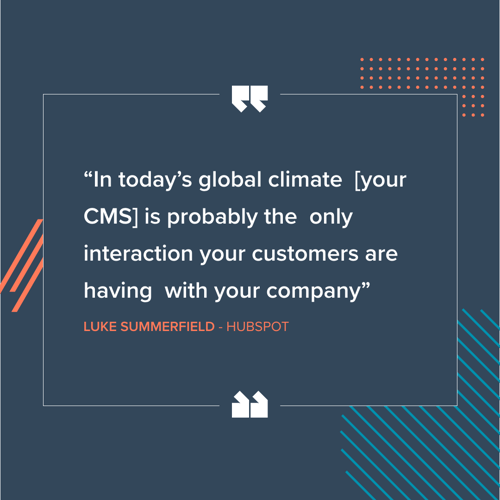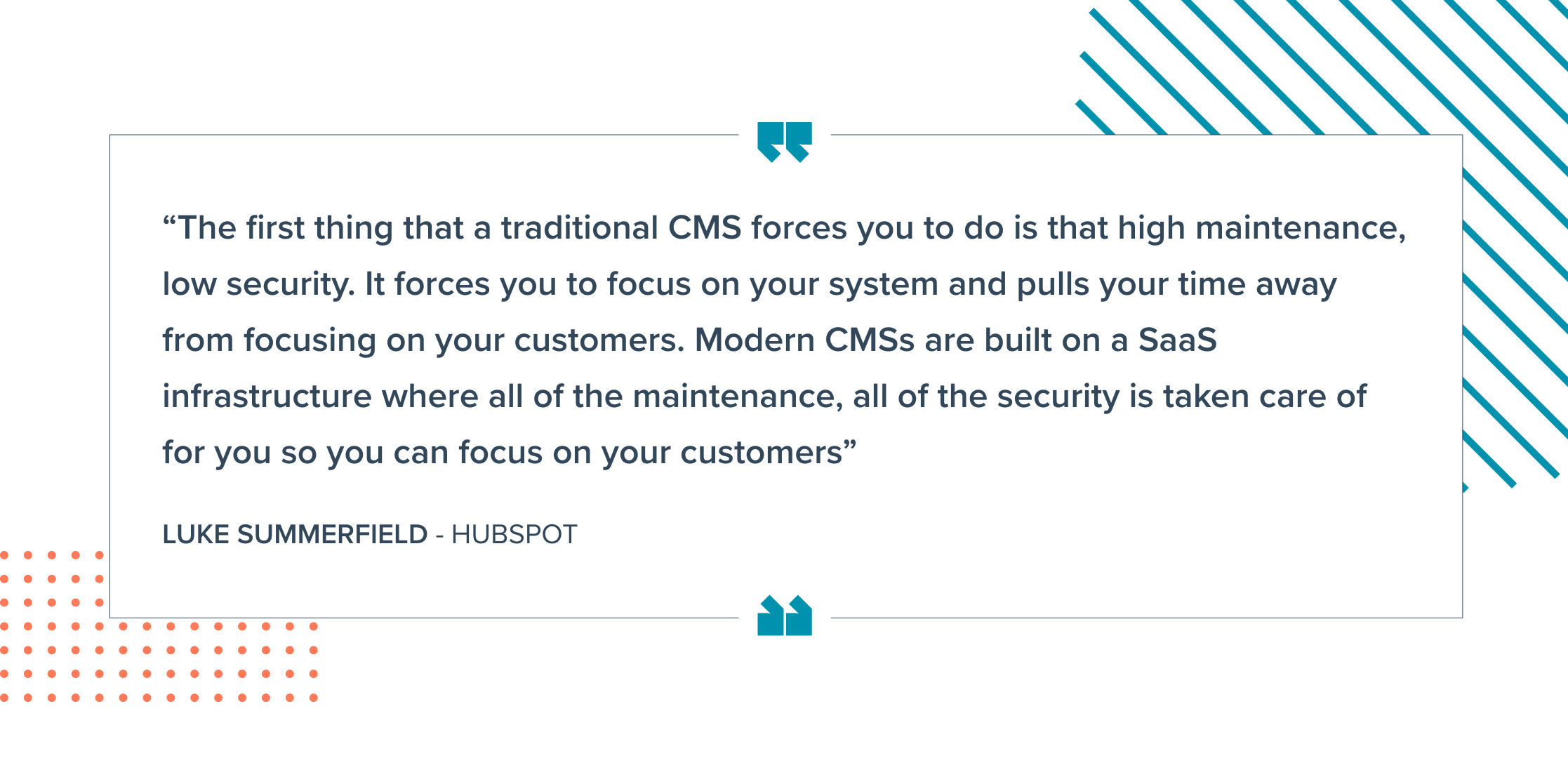In this blog post, Matthew Creswick, CMO at Huble Digital, looks at why companies decide to host their websites in HubSpot compared to any other CMS platform.
As a HubSpot partner we focus all of our website development in the HubSpot platform. However, we also hold our hands up and say when HubSpot isn’t right for you.
We believe it's important to understand the range of CMS platforms to choose from when deciding where to host your website.

The range of CMS platforms stretch in both cost and functionality. On one side, you have platforms such as WordPress. These platforms are known for being:
On the other side of the spectrum, you have platforms such as Sitecore, Adobe Experience Manager and Oracle. These platforms are known for their:
-
Enterprise Functionality
-
Advanced features
-
Expensive cost
For further reading into CMS platforms we recommend you check out G2 Crowd as a great source of information.
So, if you're able to put over £100,000 plus into your website CMS costs each year, then platforms such as Sitecore might be the tool for you. But if you’re a small business looking for a quick start up platform then WordPress may the better choice (but be prepared to move platforms later down the line as you grow and scale your business).
So where does HubSpot fit?
HubSpot very much sits somewhere in the middle between both WordPress and Sitecore. What this means is that it has enterprise functionality in tools - similar to a tool like Sitecore - but it doesn’t cost nearly as much. It costs much more in the region of lower to mid-range CMS platform (HubSpot currently costs around 300 USD per month).
So, if you're a company looking to build a brand new website and you can afford to spend approximately $4-5,000 US dollars on your CMS software a year, then HubSpot is a fantastic tool for you.
I'll go through a few reasons why HubSpot might be a great choice for you:
1. If you’re already on HubSpot
One of the main reasons you might want to move your website over to the HubSpot CMS is if you're already a user of one of the other HubSpot Hubs.
If you're using the Marketing hub, Sales Hub, Customer Service hub, or you’re using HubSpot as your main CRM system, it might make sense for you to move your website into HubSpot.
The sheer ease of using one platform is a huge benefit, but also the enrichment of data across those platforms is a huge driving factor. For example, your sales team can gather incredible data from your website information to help them sell better, and your customer service team also. This can be achieved with various data integrations and connections using different tools - but having everything in one system is so much simpler.
To find out more about HubSpot's full growth platform, we ran a panel webinar with Compleat Software – an Enterprise growth suite customer – and HubSpot, which you can watch on-demand here.
Your marketing team being able to use data directly from your website, your sales team being able to use that data too, becomes incredibly important, incredibly useful, and really drives and increases your productivity of your sales and marketing activities.
2. Personalisation
If you're looking for personalisation on your website, then HubSpot again is a fantastic platform for that.
If you imagine you have customers visiting your website frequently (be it short-term or long-term customers), you have new visitors to your website, and on top of that you might have employees visiting your website, the messages that you want to show all of those people are going to be different.
If we think about SaaS companies, as an example, they usually have a call to action (CTA) at the top of their homepage offering to download now, buy now or sign up to a free trial. As a marketer for that company, you will want to show a different CTA to each of these different groups. If somebody is an existing customer of yours, you don’t want to push them to sign up to a free demo - that's not very good user experience for them. Instead, you probably want to have a button which links to your customer support or your direct support reps.
This level of personalisation and focus is what the HubSpot CMS allows you to focus on.
For those considering the HubSpot CMS, we recommend you watch our webinar we ran with Luke Summerfield – the go-to market lead for the CMS platform at HubSpot - here. It's definitely worth the watch and Luke and Daryn (CSIO at Huble Digital) go into detail on all aspects of the CMS platform.
3. IT and Security
Last but not least, from an IT and security perspective, HubSpot has an incredible uptime. They promote the 99.99 up-time on the site and the HubSpot CMS really focuses on speed, security and reliability.
The key difference between security on the HubSpot CMS and other CMS platforms is that HubSpot takes more time to vet every single extension and app integration to ensure it’s safe and secure. This means you don’t have to worry about a rogue plugin causing a bad experience or issue on your site.
The three biggest drivers for IT is:
HubSpot CMS is secure and reliable
The HubSpot CMS takes the worry about your website out of the equation, so you can worry about the user experience and design, and not about the security. Key security features on the HubSpot CMS include: enterprise-level web application firewall, standard SSL, reverse proxy, site performance reporting & API and Content Delivery Network.

HubSpot CMS is incredibly speedy
Think about the last time you waited 30 seconds for a website to load - you didn’t. Speed is also factored into Google’s search rankings, so you should keep a close eye on it. HubSpot’s edge over other CMS platforms includes: automatic compression of images, Javascript clear up, combined CSS, code alerts, HTTP/2 and page caching.
HubSpot CMS can grow with your business - you won’t grow out of it
As companies grow, they usually change CMS platforms: starting with a quick and easy platform such as WordPress, before growing up and requiring more security, functionality and tools to meet higher demand and activity. HubSpot grows with your business and provides this functionality with features such as: user roles and partitioning, activity logging, automatic 404 system pages.
For a full list of these IT features, check out our blog: Why your IT team will love the security of the HubSpot CMS.
To Summarise...
Different CMS platforms work well for different businesses, so the key is to know exactly what your goals are when deciding on a CMS platform.
But if you're looking for a CMS platform that is secure and reliable, with a powerful tool stack that grows as you grow, then it’s likely that HubSpot is the perfect tool for you.
I hope that was useful and if you are looking to move your website into HubSpot or have any more questions on the HubSpot CMS, feel free to get in touch with me here or one of my colleagues here.









.png)





